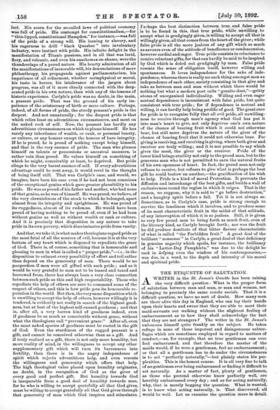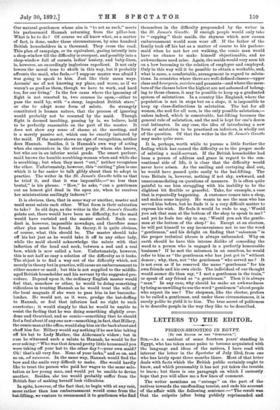THE ETIQUETTE OF SALUTATION.
AWRITER in the St. James's Gazette has been raising. the very difficult question : What is the proper form of salutation between man and man, or man and woman, not belonging to precisely the same couche soeiale. That it is a. difficult question, we have no sort of doubt. How many men. are there alive this day in England, who can lay their hands- upon their hearts and swear that they are able to meet their maid-servants out walking without the slightest feeling of embarrassment as to how they shall acknowledge the fact- that they are not strangers P The writer in the St. James's- unbosoms himself quite frankly on the subject. He takes. refuge in none of those impotent and disingenuous subter- fuges which are sometimes employed in regard to matters of conduct,—as, for example, that no true gentleman can ever feel embarrassed, and that therefore the master of the maids would, if he were a gentleman, feel no embarrassment ; or that all a gentleman has to do under the circumstances is to act "perfectly naturally,"—but plainly states his per- plexities. This is the honest course. It is all very fine to talk of no gentleman ever being embarrassed or finding it difficult to act naturally. As a matter of fact, plenty of gentlemen, as those who pretend otherwise know perfectly well, are horribly embarrassed every day ; and as for acting naturally, why, that is merely begging the question. What is wanted, is to know what acting naturally, is. That discovered, all would be well. Let us examine the question more in detail. Our natural gentlemen whose aim is "to act as such," meets his parlourmaid Hannah returning from the pillar-box. What is he to do ? Of course we all know what, as a matter of fact, is done, under these circumstances, by nine hundred British householders in a thousand. They cross the road. This plan of campaign, or its equivalent, gazing intently into a shop-window till the difficulty is overpast, and possibly into a shop-window full of corsets, ladies' hosiery, and baby-linen, is, however, an exceedingly inglorious expedient. It not only lowers the moral tone to skulk in this way, but it probably affronts the maid, who feels,—' I suppose master was afraid I was going to speak to him. Just like their mean ways. Accusin' me of not knowing my place, and worse, as if we weren't as good as them, though we have to work, and hard too, for our living.' In the few cases where the ignominy of flight is not resorted to, two courses lie open,—either to pass the maid by, with "a stony, impudent British stare," or else to adopt some form of salute. So strangely constituted is human nature, that the process of ignoring would probably not be resented by the maid. Though flight is deemed insulting, passing by is, we believe, held to be perfectly reasonable on the part of the master. It does not show any sense of shame at the meeting, and is a merely passive act, which can be exactly imitated by the maid. If the master shows no sign of recognition, neither does Hannah. Besides, it is Hannah's own way of acting when she encounters in the street people whom she knows, but who are in an inferior social grade. The smart parlour- maid knows the humble scrubbing-woman when and while she is scrubbing ; but when they meet "out," neither recognises the other. Unfortunately, however, this " cutting " plan is one which it is far easier to talk glibly about than to adopt in practice. The writer in the St. James's Gazette tells us that he tried it, and that it was impossible,—" no less than brutal," is his phrase. "How," he asks, "can a gentleman cut an honest girl dead in the open air, when he receives her ministrations smilingly indoors P " It is obvious, then, that in some way or another, master and maid must salute each other. What form is their salutation to take ? In old days, as the writer in the St. James's Gazette points out, there would have been no difficulty, for the maid would have curtsied and the master smiled. Such con- duct is, however, impossible nowadays, and therefore some other plan must be found. In theory, it is quite obvious, of course, what this should be. The master should take off his hat just as he would take it off to any other lady, while the maid should acknowledge the salute with that inflection of the head and neck, between a nod and a real bow, which is now called a bow. Unfortunately, however, this is not half so easy a solution of the difficulty as it looks. The object is to find a way out of the difficulty which, not merely in theory but in practice, will cause no embarrassment to either master or maid ; but this is not supplied to the middle- aged British householder and his servant by the suggested pro- cedure. Depend upon it, the ordinary English master would feel that, somehow or other, he would be doing something ridiculous in treating Hannah as he would treat the wife of the local magnate if she were to pass him in her barouche- landau. He would not, as it were, grudge the hat-doffing to Hannah, or feel that inferiors had no right to such 'courtesies; it would simply be that he would be unable to resist the feeling that he was doing something slightly over- done and theatrical, and so comic—something that he should feel a fool about if any one saw—something, in fact, that Hillary, the comic man at the office, would slap him on the back aboutand chaff him for Hillary would say nothing if he saw him taking off his hat to Lady Mather, the Alderman's widow ; but in ease he witnessed such a salute to Hannah, he would be for ever asking : "Who was that deuced pretty little housemaid you were taking off your hat to the other day P—your own maid? Oh! that's all very fine. None of your larks," and so on, and so on, ad nauseam. In the same way, Hannah would find the bow and the smile very difficult to make. She would hardly like to treat the person who paid her wages to the same salu- tation as her young man, and would yet be unable to devise another. Besides, she too would probably suffer from the British fear of making herself look ridiculous.
In spite, however, of the fact that, to begin with at any rate, more rather than less embarrassment would come from the hat-lifting, we venture to recommend it to gentlemen who find
themselves in the difficulty propounded by the writer in the St. James's Gazette. If enough people would only take to " capping " their maids, the shyness which now causes embarrassment would soon wear off. If the father of the family took off his hat as a matter of course to his parlour- maid when he met her out walking, the comic man would have no chance to make himself objectionable, and no awkwardness need arise. Again, the maids would very soon hit on a bow becoming to the relation of employer and employed. Only in this way will it be possible to obtain a workable, and, what is more, a comfortable, arrangement in regard to saluta- tions. In countries where there are well-defined classes—upper class and bourgeois, ouvriers and peasants—and where the mem- bers of the classes below the highest are not ashamed of belong- ing to those classes, it may be possible to keep up a graduated system of salutations. In a country like England, where the population is not in steps but on a slope, it is impossible to keep up class-distinctions in salutation. The hat for all women, the nod for all men, is the only possible salutation,— unless indeed, which is conceivable, hat-lifting becomes the general rule of salutation, and the nod is kept for one's dozen real intimates. In any case, the idea of introducing a new form of salutation to be practised on inferiors, is wholly out of the question. Of that the writer in the St. James's Gazette may make quite sure.
It is, perhaps, worth while to pursue a little further the feeling which has caused the difficulty as to the proper mode of saluting a maid-servant. If the British householder had been a person of address and grace in regard to the con- ventional side of life, it is clear that the difficulty would never have arisen. As the smiling and curtsying died out, he would have passed quite easily to the hat-lifting. The true Britain is, however, nothing if not shy, awkward, and unaccommodating on questions of manners. It is often quite painful to see him struggling with his inability to be the slightest bit flexible or graceful. Take, for example, a case that is repeatedly happening. A customer comes into a shop, and makes some inquiry. He wants to see the man who has served him before, but he finds it is a very difficult matter to express his wish. He feels it would be rude to say, Would you ask that man at the bottom of the shop to speak to me P ' and yet he feels too shy to say, Would you ask the gentle- man at the bottom of the shop ?' 8re. Except at an election, he will put himself to any inconvenience not to use the word "gentleman," and his delight on finding that " salesman " is the proper technical phrase is always unbounded. Why on earth should he have this intense dislike of conceding the word to a person who is engaged in a perfectly honourable business If he met the salesman in an omnibus, he would refer to him as "the gentleman who has just got in" without demur; why, then, not "the gentleman" who served me P It is not even as if he reserved the name "gentleman" for his own friends and his own circle. The individual of our thought would sooner die than say, "I met a gentleman in the train," or speak of any friend as "a gentleman." Then it is always "man." In any case, why should he make an awkwardness by being so unwilling to use the word " gentlemen " about people who expect its use? The shopman, like the elector, prefers to be called a gentleman, and under these circumstances, it is surely polite to yield it to him. The true secret of politeness is to describe people in the way they like to be described.



































 Previous page
Previous page